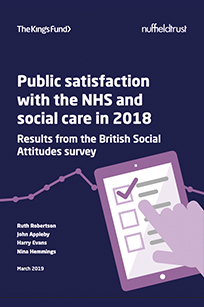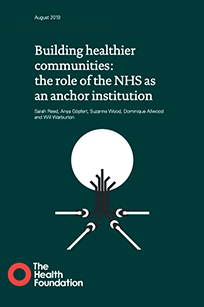News review – September 2019
A general election could be the ultimate outcome of the Brexit debate, but leaving the European Union by 31 October and preparing for a no-deal exit are the government’s prime focus. The Department of Health and Social Care is at the forefront of preparations and in August invited bids for a £25m contract to set up an express air freight service for urgent medicines and medical products post-Brexit. The contract allows for small parcels of urgent medicines or products to arrive within 24 hours. Larger pallet goods would arrive within two to four days.
Mr Johnson has famously called for a can-do spirit and positivity on Brexit, but at the beginning of the summer finance directors’ outlook remained pessimistic despite the additional funding that is going into the NHS from April this year. According to the King’s Fund’s Quarterly monitoring report, 27% of trust finance leaders expect their trust to be in deficit at the end of this financial year. Most of them predict that the NHS will fail to achieve targets set out in the NHS long-term plan, including for the sector to be in balance in 2020/21 and the aim for deficits in NHS organisations to be eradicated by 2023/24.
 Around half of the population believe it is difficult to get a GP appointment, while most (86%) say too many people use A&E departments unnecessarily, according to the latest British Social Attitudes Survey. While 17% prefer A&E to GPs because they can get tests done more quickly, the preference rises to 29% among people from the most deprived areas. And though 11% said they have no confidence in GPs, this rises to 18% in the most deprived areas and 20% among those with children under 5.
Around half of the population believe it is difficult to get a GP appointment, while most (86%) say too many people use A&E departments unnecessarily, according to the latest British Social Attitudes Survey. While 17% prefer A&E to GPs because they can get tests done more quickly, the preference rises to 29% among people from the most deprived areas. And though 11% said they have no confidence in GPs, this rises to 18% in the most deprived areas and 20% among those with children under 5.
July saw the highest number of people seeking emergency and urgent care since records began, according to NHS Providers. It said the latest performance figures for England reflected sustained increases in demand, particularly from older and frail people. The NHS England figures showed attendances at A&E up by 4% on those in July 2018, while emergency admissions were 4.6% higher than a year earlier. The number of patients waiting to start elective treatment also increased – at the end of June there were 4.4 million people on the waiting list, also 4.6% more than in June 2018. NHS Providers said that, unlike previous years, trusts had not been able to use lower emergency demand in the summer months to clear waiting lists.
Many senior doctors are reportedly angry over potential pension tax bills, though they did receive some good news as consultants and dentists were handed a 2.5% pay rise, backdated to April. The Department of Health and Social Care said the award was worth between £1,940 and £2,630 for consultants. The value of clinical excellence awards is being frozen. Specialist doctors and associate specialists will in addition receive an extra 1% in 2020/21 conditional on contract form, through a multi-year deal. The deal follows the June announcement of a four-year deal for doctors and dentists in training, which guarantees an uplift of 2% a year.
 NHS Improvement claimed that the national staff retention programme has been a major step forward in supporting trusts to encourage staff to remain in the NHS. A review of the programme, which was launched two years ago, said it has given trusts the ‘tools, knowledge and expertise’ to develop staff retention initiatives. National nursing turnover has fallen from 12.5% to 11.9% and mental health clinical staff turnover has decreased from 14.3% to 13.4%, the report said.
NHS Improvement claimed that the national staff retention programme has been a major step forward in supporting trusts to encourage staff to remain in the NHS. A review of the programme, which was launched two years ago, said it has given trusts the ‘tools, knowledge and expertise’ to develop staff retention initiatives. National nursing turnover has fallen from 12.5% to 11.9% and mental health clinical staff turnover has decreased from 14.3% to 13.4%, the report said.
NHS Improvement also published a flow chart setting out the process for filling a vacancy for admin and clerical or estates and facilities post or shift. Under new rules, from this month trusts will be required to use bank or substantive contracts to fill administration and estates shifts rather than using agency staff. There are a few exceptions and the flowchart sets out the decision-making process trusts should adopt.
The health and social care (HSC) workforce in Northern Ireland increased by 12% between 2010 and 2019, according to the latest census of local staff. The Belfast Trust is the largest employer with almost 18,000 whole-time equivalents or 31% of all staff. The census also found that 38% of HSC staff are employed at Agenda for Change bands 1 to 4, and 79% of staff are women. Administration and clerical staff make up 19% of the workforce – nursing and midwifery is the single biggest group (34%).
A national clinical plan for specialist services in Wales is under development, according to a written statement from health and social services minister Vaughan Gething. He said clinicians will be expected to work to national clinical pathways set out in the plan. The pathways will be based on prudent healthcare, value-based care and quality improvement at scale and pace. They will focus on system working and include prevention and population health as well as secondary and tertiary care.
 The NHS should make a greater contribution to improving social and economic conditions for people in their local area, according to the Health Foundation. In a report, the foundation proposed NHS bodies should be ‘anchor institutions’ for local areas. An anchor institution is ‘a large, public sector organisation with sizeable assets that could be used to support community wealth building and development, and in doing so, advance the welfare of local people’, it said. The report, Building healthier communities: the role of the NHS as an anchor institution, said NHS organisations could achieve this by several means, including widening access to quality employment; leveraging assets and land for community benefit; and leading on environmental sustainability.
The NHS should make a greater contribution to improving social and economic conditions for people in their local area, according to the Health Foundation. In a report, the foundation proposed NHS bodies should be ‘anchor institutions’ for local areas. An anchor institution is ‘a large, public sector organisation with sizeable assets that could be used to support community wealth building and development, and in doing so, advance the welfare of local people’, it said. The report, Building healthier communities: the role of the NHS as an anchor institution, said NHS organisations could achieve this by several means, including widening access to quality employment; leveraging assets and land for community benefit; and leading on environmental sustainability.
QUOTES
‘This express freight service sends a clear message to the public that our plans should ensure supply of medical goods remains uninterrupted as we leave the EU.’
Health minister Chris Skidmore on the Department stepping up preparations for Brexit
‘These figures show the health service is still struggling to climb out of the morass created by a decade of austerity. Year on year, the demands made on frontline services continue to grow, with attendances at A&E significantly higher than at this time last year. Our dedicated staff do all they can for patients, but they are being stretched to breaking point.’
The NHS is struggling to escape the effects of austerity, says Nick Ville, director of membership and policy at the NHS Confederation
 ‘Despite the funding boost, unrelenting financial and operational pressures suggest patients are not going to see improvements in care for some time yet. Thanks to the hard work of staff, the NHS is treating more patients than ever. But without a concerted effort to address staff shortages and more investment, ambitions to improve patient care will remain more aspirational than realistic.’
‘Despite the funding boost, unrelenting financial and operational pressures suggest patients are not going to see improvements in care for some time yet. Thanks to the hard work of staff, the NHS is treating more patients than ever. But without a concerted effort to address staff shortages and more investment, ambitions to improve patient care will remain more aspirational than realistic.’
King’s Fund chief analyst Siva Anandaciva says its latest QMR offers a reality check
‘There is a clear need for the NHS to make a broader contribution to people’s lives, leveraging its considerable resources to improve the economic and social conditions that so fundamentally affect our health.’
Dominique Allwood, Health Foundation assistant director of improvement, says the NHS must contribute to the wider determinants of health
From the HFMA
Over the summer the HFMA invited commentators to examine the key issues, challenges and opportunities in the NHS long-term plan in a series of blogs.
In the first blog, Public Health England chief economist Brian Ferguson says the NHS must shift spending towards prevention of ill health. Embedding prevention as a ‘must do’ is fast becoming imperative as projections show the funding gap is likely to widen.
In his blog, Raj Patel, NHS England deputy national medical director of primary care, outlines the benefits of primary care networks (PCNs). As the population ages, primary care will help meet the consequent demand – PCNs will offer greater coverage, with collaboration between practices and new multidisciplinary teams.
Safer and more efficient care can be gained from new digital technologies in healthcare, says James Hawkins, director of strategy (AI) at NHS Digital. Technological advances can free up clinicians’ time and support patients to self-care, but the NHS must also gain public trust over the use of their personal data, he adds.
In the final blog in the series, Michael Dimov, NHS England and NHS Improvement senior adviser (Community Health Improvement), says significant developments at the centre will likely drive the transformation of community services. These include the release of activity data, which will allow robust and transparent benchmarking – the first step to developing comprehensive dashboards demonstrating the value delivered by community services.
• Visit www.hfma.org.uk/news/blogs for more
Related content
We are excited to bring you a fun packed Eastern Branch Conference in 2025 over three days.
This event is for those that will benefit from an overview of costing in the NHS or those new to costing and will cover why we cost and the processes.